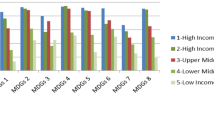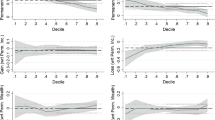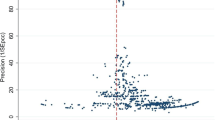Abstract
In the study of human welfare and progress, two prominent approaches stand out, but they appear to have opposite perspectives and even opposite weaknesses. The capability approach (CA), founded by A. Sen, focuses on the objective factors that contribute to human welfare. The happiness approach (HA), initiated by R. Easterlin, focuses on subjective well-being as the outcome of living conditions. The main weaknesses regard ‘aggregation’ for the CA but not for the HA, and ‘adaptation’ for the CA but not for the HA. The paper suggests to integrate the two approaches by adopting the perspective of endogenous dynamics which was put forward by Scitovsky (who was a forerunner of the HA) but which remained undeveloped. This perspective helps to avoid the just mentioned and other weaknesses; it widens the research field to include both poor and rich countries and communities; and it contributes to link the objective with the subjective evaluations of individual welfare. Empirical evidence drawn from the recent interdisciplinary literature provides some support for the analyses.
Similar content being viewed by others
Notes
Sen also rejected Nussbaum’s (2003) proposal of a defined list of ten capabilities, because he claimed that any list should be adapted to the context.
Typical questions, taken from the World Values Survey, are: “All considered you would say that you are: 1. very happy; 2. pretty happy; 3. not too happy; 4. not at all happy?”; “All things considered, how satisfied are you with your life as a whole these days?”. The answer to this second question can be given on a scale from 1 to 10.
Learning is sufficient if its positive effect is greater than the possible negative effect of the natural decay of the personal conversions factor due to people’s aging.
More rigorously, the personal conversion factors are due to the cumulated experience of functionings net of decay over some minimum initial levels.
Scitovsky (1986: 189,198) cited the notable cases of the abilities of Keynes’ investors and Schumpeter’s entrepreneurs.
Scitovsky usually treated the pursuit of novelty as a purposeful search for new knowledge, but he also recognised that one variety of novelty is pursued for pure excitement, such as that typically given by uncertainty in games. In this case, ‘chance novelty’ may be the proper label, and it can be associated with our group I because it is usually sought in order to escape from boredom, which is a kind of discomfort (Scitovsky 1996, 2000).
See also the survey by Veenhoven (2010) on other specific empirical studies.
In a similar vein, Fredrickson (2001) puts forward the theory claiming that experiences of positive emotions help people to build their enduring personal resources, from intellectual to social.
References
Alkire, S. (2002). Valuing freedoms: Sen’s capability approach and poverty reduction. New York: Oxford University Press.
Alkire, S. (2008). Subjective measures of agency. In L. Bruni, F. Comim, & M. Pugno (Eds.), Capabilities and happiness (pp. 254–285). Oxford: Oxford University Press.
Anand, P., Hunter, G., Carter, I., Dowding, K., Guala, F., & van Hees, M. (2009). The development of capability indicators. Journal of Human Development and Capabilities, 10(1), 125–152.
Anand, P., Hunter, G., & Smith, R. (2005). Capabilities and well-being. Social Indicators Research, 74, 9–55.
Anand, P., Krishnakumar, J., & Tran, N. B. (2011). Measuring welfare. Journal of Public Economics, 95(3–4), 205–215.
Biggeri, M., & Santi, M. (2012). The missing dimensions of children’s well-being and well-becoming in education systems. Journal of Human Development and Capabilities, 13, 373–395.
Binder, M. (2013). Subjective well-being capabilities. Journal of Happiness Studies,. doi:10.1007/s10902-013-9471-6.
Binder, M., & Broekel, T. (2012). The neglected dimension of well-being. Journal of Socio-Economics, 41, 37–47.
Binder, M., & Coad, A. (2011). Disentangling the circularity in Sen’s capability approach. Social Indicators Research, 103(3), 327–355.
Binder, M., & Coad, A. (2013). Life satisfaction and self-employment. Small Business Economics, 40(4), 1009–1033.
Binder, M., & Freytag, A. (2013). Volunteering, subjective well-being and public policy. Journal of Economic Psychology, 34, 97–119.
Bradley, D. E., & Roberts, J. A. (2004). Self-employment and job satisfaction. Journal of Business Management, 42(1), 37–58.
Bruni, L., Comim, F., Pugno, M. (Eds.). (2008). Capabilities and Happiness. Oxford: Oxford University Press.
Comim, F. (2005). Capabilities and happiness. Review of Social Economy, 63, 161–176.
Csikszentmihalyi, M. (1999). If we are so rich, why aren’t we happy?. American psychologist (Oct) 821–827.
Cunha, F., & Heckman, J. J. (2007). The technology of skill formation. American Economic Review, 97(2), 31–47.
Deci, E. L., & Ryan, R. M. (2000). The “what” and “why” of goal pursuits. Psychological Inquiry, 11, 227–268.
Diener, E., Lucas, R. E., Smith, H. L., & Suh, E. M. (1999). Subjective well-being. Psychological Bulletin, 125, 276–301.
Dolan, P., Peasgood, T., & White, M. (2008). Do we really know what makes us happy? Journal of Economic Psychology, 29, 94–122.
Earl, P. E. (1992). Tibor Scitovsky. In W. J. Samuels (Ed.), New horizons in economic thought (pp. 265–293). Aldershot: Elgar.
Easterlin, R. A. (1974). Does economic growth improve the human lot? In P. A. David & W. R. Melvin (Eds.), Nations and households in economic growth (pp. 89–125). New York: Academic Press.
Easterlin, R. A. (2001). Income and happiness. Economic Journal, 111, 465–484.
Frank, R. H. (1997). The frame of reference as a public good. Economic Journal, 107, 1832–1847.
Fredrickson, B. L. (2001). The role of positive emotions in positive psychology. American Psychologist, 56(3), 218–226.
Frey, B. S., & Stutzer, A. (2002). What can economists learn from happiness research? Journal of Economic Literature, 40(2), 402–435.
Gilead, T. (2013). Educational insights of the economist Tibor Scitovsky. Studies in Philosophy and Education,. doi:10.1007/s11217-013-9355-6.
Graham, C. (2011). The pursuit of happiness. Washington, D.C.: The Brookings Institution Press.
Graham, C., Nikolova, M. (2013). Happy peasants and frustrated achievers?. HCEO, University of Chicago, Working Paper #2013–013.
Heckman, J. J. (2008). School, skills, and synapses. NBER Working Paper #14064.
Hsee, K., Xu, F., & Tang, N. (2008). Two recommendations on the pursuit of happiness. Journal of Legal Studies, 37, S115–S132.
Huang, J., van den Brink, H. M., & Groot, W. (2009). A meta-analysis of the effect of education on social capital. Economics of Education Review, 28(4), 454–464.
Inglehart, R., Foa, R., Peterson, C., & Welzel, C. (2008). Development, freedom and rising happiness. Perspectives on Psychological Science, 3, 264–285.
Kahneman, D., Diener, E., & Schwarz, N. (Eds.). (1999). Well-being. New York: Russell Sage.
Keyes, C. L. M., Ryff, C. D., & Shmotkin, D. (2002). Optimizing well-being. Journal of Personality and Social Psychology, 82(6), 1007–1022.
Krueger, A. B., & Schkade, D. A. (2008). The reliability of subjective well-being measures. Journal of Public Economics, 92, 1833–1845.
Kuklys, W. (2005). Amartya Sen’s capability approach. Berlin: Springer.
Kuklys, W., & Robeyns, I. (2005). Sen’s capability approach to welfare economics. In W. Kuklys (Ed.), Amartya Sen’s capability approach (pp. 9–30). Berlin: Springer.
Lanzi, D. (2007). Capabilities, human capital and education. Journal of Socio-Economics, 36, 424–435.
Lavigne, L. G., Vallerand, R. J., & Crevier-Braud, L. (2011). The fundamental need to belong. Personality and Social Psychology Bulletin, 37(9), 1185–1201.
Layard, R. (2005). Happiness. New York: Penguin.
Mancini, A. D., Bonanno, G. A., & Clark, A. E. (2011). Stepping off the hedonic treadmill. Journal of Individual Differences, 32(3), 144–152.
Meier, S., & Stutzer, A. (2008). Is volunteering rewarding in itself? Economica, 75, 39–59.
Muffles, R., & Headey, B. (2013). Capabilities and choices. Social Indicators Research, 110(3), 1159–1185.
Nussbaum, M. (2003). Capabilities as fundamental entitements. Feminist Economics, 9, 33–59.
Nussbaum, M. (2011). Creating capabilities. Cambridge: Harvard University Press.
Oreopoulos, P., & Salvanes, K. G. (2011). Priceless. Journal of Economic Perspective, 25, 159–184.
Oswald, A. J. (1997). Happiness and economic performance. Economic Journal, 107, 1815–1831.
Ovaska, T., & Takashima, B. (2006). Economic policy and the level of self-perceived well-being. Journal of Socio-Economics, 35, 308–325.
Piper, A. T. (2012). Heaven knows I’m miserable now. MPRA Paper #43259.
Pugno, M. (2013). Scitovsky and the income-happiness paradox. Journal of Socio-Economics, 43, 1–10.
Pugno, M. (2014). Scitovsky’s ‘the joyless economy’ and the economics of happiness. European Journal of the History of Economic Thought, 21(2), 278–303. doi:10.1080/09672567.2012.683028.
Robeyns, I. (2003). Sen’s capability approach and gender inequality. Feminist Economics, 9(2–3), 61–92.
Robeyns, I. (2005). The capability approach. Journal of Human Development, 6, 93–114.
Robeyns, I. (2006). The capability approach in practice. Journal of Political Philosophy, 14(3), 351–376.
Rotter, J. B. (1966). Generalised expectancies of internal versus external control of reinforcements. Psychological Monographs, 80, 1–28.
Ryff, C. D., & Singer, B. H. (2008). Know thyself and become what you are. Journal of Happiness Studies, 9(1), 13–39.
Saito, M. (2003). Amartya Sen’s capability approach to education. Journal of Philosophy of Education, 37(1), 17–33.
Scitovsky, T. (1986). Human desires and economic satisfaction. New York: New York University Press.
Scitovsky, T. (1992). The Joyless Economy. Oxford: Oxford University Press. Second edition. [First edition in 1976].
Scitovsky, T. (1996). My own criticism of the joyless economy. Critical Review, 10(4), 595–606.
Scitovsky, T. (2000). The wages of boredom. New Perspectives Quarterly, 17(2), 45–51.
Sen, A. K. (1985a). Commodities and capabilities. Amsterdam: North Holland.
Sen, A. K. (1985b). Well-being, agency and freedom. Journal of Philosophy, 83, 169–221.
Sen, A. K. (1992). Inequality re-examined. Oxford: Clarendon Press.
Sen, A. K. (1993). Capability and well-being. In A. Sen & M. Nussbaum (Eds.), The quality of life (pp. 30–53). Oxford: Clarendon Press.
Sen, A. K. (1996). Rationality, joy and freedom. Critical Review, 10(4), 481–494.
Sen, A. K. (1999a). Development as freedom. New York: Knopf.
Sen, A. K. (1999b). Investing in early childhood. Conference on Breaking the Poverty Cycle. Inter-American Development Bank, Washington, DC.
Sen, A. K. (2002). Rationality and freedom. Cambridge: Belknap Press.
Sheldon, K. M., Boehm, J., & Lyubomirsky, S. L. (2012). Variety is the spice of happiness. In I. Boniwell & S. David (Eds.), Oxford handbook of happiness (pp. 901–914). Oxford: Oxford University Press.
Sheldon, K. M., & Lyubomirsky, S. (2006). Achieving sustainable gains in happiness. Journal of Happiness Studies, 7(1), 55–86.
Silvia, P. J., & Kashdan, T. B. (2009). Interesting things and curious people. Social and Personality Psychology Compass, 3(5), 785–797.
Stiglitz, S., Sen, A., & Fitoussi, J.-P. (2009). Report by the commission on the measurement of economic performance and social progress. Brussels: European Union.
Stutzer, A., Frey, B. (2012). Recent developments in the economics of happiness, IZA Discussion paper #7078.
Sugden, R. (1986). Review of ‘commodities and capabilities’. Economic Journal, 96(383), 820–822.
Sugden, R. (1993). Resources, and capabilities. Journal of Economic Literature, 31, 1947–1962.
United Nations Development Program (1990–2013) The human development report, United Nations Development Program, New York.
van Hoorn, A., Mabsout, R., & Sent, E.-M. (2010). Happiness and capability. Journal of Socio-Economics, 39, 339–343.
van Praag, M., van Witteloostuijn, A., van der Sluis, J. (2009). Returns for entrepreneurs vs. employees, IZA Discussion paper #4628.
Veenhoven, R. (2000). The four qualities of life. Journal of Happiness Studies, 1, 1–39.
Veenhoven, R. (2010). Capability and happiness. Journal of Socio-Economics, 39, 344–350.
Verme, P. (2009). Happiness, freedom and control. Journal of Economic Behavior & Organization, 71(2), 146–161.
Vittersø, J. (2003). Flow vs. life satisfaction. Journal of Happiness Studies, 4, 141–167.
Vittersø, J., Oelmann, H. I., & Wang, A. L. (2009). Life satisfaction is not a balanced estimator of the good life. Journal of Happiness Studies, 10, 1–17.
Wang, Q., Bowling, N. A., & Eschleman, K. J. (2010). A meta-analytic examination of work and general locus of control. Journal of Applied Psychology, 95(4), 761–768.
Acknowledgments
This paper is an elaboration of my presentation at the Conference on “Public Happiness” (June 4–5 2013, Rome, Italy), where I benefited from comments from, and discussions with, several participants, in particular Neil De Marchi, Mozaffar Qizilbash, Luigino Bruni, Carol Ryff and Chad Baum. I wish to thank also the two anonymous referees for comments and suggestions. The financial support for this research provided by MIUR is gratefully acknowledged.
Author information
Authors and Affiliations
Corresponding author
Rights and permissions
About this article
Cite this article
Pugno, M. Capability and Happiness: A Suggested Integration From a Dynamic Perspective. J Happiness Stud 16, 1383–1399 (2015). https://doi.org/10.1007/s10902-014-9559-7
Published:
Issue Date:
DOI: https://doi.org/10.1007/s10902-014-9559-7




